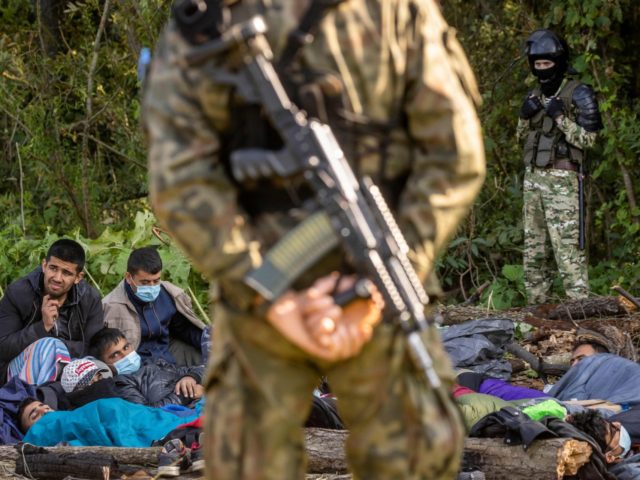Poland and Lithuania, battling border crises reportedly engineered by the Lukashenko regime in Belarus, are under pressure from the United Nations and the Council of Europe to let the migrants in.
The two European Union border states have endured a sudden surge in illegal immigration in recent months, thought to have been engineered by Alexander Lukashenko as punishment for their sheltering Belarusian opposition politicians and dissidents victimised by his quasi-Stalinist regime.
The two countries have responded robustly, closing their borders and announcing the construction of border walls amid reports that the mostly African, Middle Eastern, and South Asian — with Iraqis heavily represented initially, although an increasing number of Afghans are now appearing — are being brought directly to Belarus by the Lukashenko regime in concert with people-smugglers and then transported to the borders of Lithuania and Belarus as a form of “hybrid warfare”.
Unusually, the Polish and Lithuanian governments have received support from the European Union, despite past criticism of Hungary’s border wall and the refusal of countries including Poland to accept EU-imposed migrant redistribution quotas — but they are still being pressured to let the migrants in by other globalist international bodies.
“While we acknowledge the challenges posed by recent arrivals to Poland, we call on the Polish authorities to provide access to territory, immediate medical assistance, legal advice, and psychosocial support to these people,” demanded the United Nations High Commissioner for Refugees (UNHCR), also known as the UN Refugee Agency, through its representative in Poland, Christine Goyer.
“States have the legitimate right to manage their borders in accordance with international law. However, they must also respect human rights, including the right to seek asylum,” the UNHCR added in a statement quoted by Reuters.
Why the UN should put the onus on Poland to assist the migrants in question rather than Belarus — which is refusing to allow migrants stopped at the frontier by the Polish border guard and military to turn back, leading to tense scenes of armed Poles and Belarusians standing just feet apart with a makeshift migrant squatter camp between them — is unclear.
Poland’s foreign ministry alluded to this ignored responsibility of Belarus for the people its government is believed to have brought to Europe in the first place in its response to the UNHCR, saying: “Poland fully respects the Convention Relating to the Status of Refugees and complies with its provisions in the current situation. At the same time, we expect that Belarus, as a party to the Convention, to fulfill its obligations and will provide appropriate care to people in its territory.”
Meanwhile, neighbouring Lithuania is under similar pressure to give way to the Lukashenko-engineered migrant surge from the Council of Europe, the 47-member intergovernmental organisation which oversees the European Court of Human Rights which enforces the European Convention on Human rights — not to be confused with the Council of the European Council and the European Council, which are — somewhat confusingly — European Union bodies.
The European pressure campaign came to light with reports on part of an exchange of letters between the Lithuanian government and the Council of Europe, in which CoE human rights commissioner Dunja Mijatović, a Bosnian, complained that changes to Lithuanian law strengthening the country’s border protections “remove, in the case of an emergency situation, significant safeguards in the asylum procedure”.
Lithuanian prime minister Ingrida Šimonytė is, for the time being, remaining steadfast, responding that the legislative changes are designed “to speed up final decisions on asylum applications” and that they include “an effective judicial remedy” for rejected migrants who wish to appeal the decision against them.
Mijatović has also urged Poland to “take in the migrants” on its Belarusian frontier on social media.

COMMENTS
Please let us know if you're having issues with commenting.